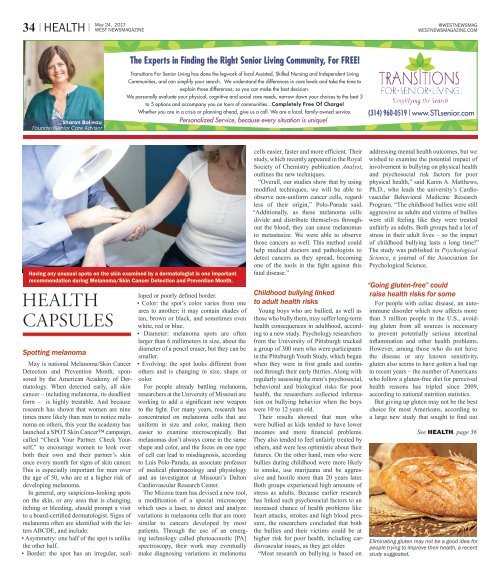West Newsmagazine 5-24-17
Local news, local politics and community events for West St. Louis County Missouri.
Local news, local politics and community events for West St. Louis County Missouri.
Create successful ePaper yourself
Turn your PDF publications into a flip-book with our unique Google optimized e-Paper software.
34 I HEALTH I<br />
May <strong>24</strong>, 20<strong>17</strong><br />
WEST NEWSMAGAZINE<br />
@WESTNEWSMAG<br />
WESTNEWSMAGAZINE.COM<br />
The Experts in Finding the Right Senior Living Community, For FREE!<br />
Sharon Balleau<br />
Founder/Senior Care Advisor<br />
Transitions For Senior Living has done the legwork of local Assisted, Skilled Nursing and Independent Living<br />
Communities, and can simplify your search. We understand the differences in care levels and take the time to<br />
explain those differences; so you can make the best decision.<br />
We personally evaluate your physical, cognitive and social care needs, narrow down your choices to the best 3<br />
to 5 options and accompany you on tours of communities...Completely Free Of Charge!<br />
Whether you are in a crisis or planning ahead, give us a call. We are a local, family-owned service.<br />
Personalized Service, because every situation is unique!<br />
(314) 960-0519 | www.STLsenior.com<br />
Having any unusual spots on the skin examined by a dermatologist is one important<br />
recommendation during Melanoma/Skin Cancer Detection and Prevention Month.<br />
health<br />
capsules<br />
Spotting melanoma<br />
May is national Melanoma/Skin Cancer<br />
Detection and Prevention Month, sponsored<br />
by the American Academy of Dermatology.<br />
When detected early, all skin<br />
cancer – including melanoma, its deadliest<br />
form – is highly treatable. And because<br />
research has shown that women are nine<br />
times more likely than men to notice melanoma<br />
on others, this year the academy has<br />
launched a SPOT Skin Cancer campaign,<br />
called “Check Your Partner. Check Yourself,”<br />
to encourage women to look over<br />
both their own and their partner’s skin<br />
once every month for signs of skin cancer.<br />
This is especially important for men over<br />
the age of 50, who are at a higher risk of<br />
developing melanoma.<br />
In general, any suspicious-looking spots<br />
on the skin, or any area that is changing,<br />
itching or bleeding, should prompt a visit<br />
to a board-certified dermatologist. Signs of<br />
melanoma often are identified with the letters<br />
ABCDE, and include:<br />
• Asymmetry: one half of the spot is unlike<br />
the other half.<br />
• Border: the spot has an irregular, scalloped<br />
or poorly defined border.<br />
• Color: the spot’s color varies from one<br />
area to another; it may contain shades of<br />
tan, brown or black, and sometimes even<br />
white, red or blue.<br />
• Diameter: melanoma spots are often<br />
larger than 6 millimeters in size, about the<br />
diameter of a pencil eraser, but they can be<br />
smaller.<br />
• Evolving: the spot looks different from<br />
others and is changing in size, shape or<br />
color.<br />
For people already battling melanoma,<br />
researchers at the University of Missouri are<br />
working to add a significant new weapon<br />
to the fight. For many years, research has<br />
concentrated on melanoma cells that are<br />
uniform in size and color, making them<br />
easier to examine microscopically. But<br />
melanomas don’t always come in the same<br />
shape and color, and the focus on one type<br />
of cell can lead to misdiagnosis, according<br />
to Luis Polo-Parada, an associate professor<br />
of medical pharmacology and physiology<br />
and an investigator at Missouri’s Dalton<br />
Cardiovascular Research Center.<br />
The Mizzou team has devised a new tool,<br />
a modification of a special microscope<br />
which uses a laser, to detect and analyze<br />
variations in melanoma cells that are more<br />
similar to cancers developed by most<br />
patients. Through the use of an emerging<br />
technology called photoacoustic [PA]<br />
spectroscopy, their work may eventually<br />
make diagnosing variations in melanoma<br />
cells easier, faster and more efficient. Their<br />
study, which recently appeared in the Royal<br />
Society of Chemistry publication Analyst,<br />
outlines the new techniques.<br />
“Overall, our studies show that by using<br />
modified techniques, we will be able to<br />
observe non-uniform cancer cells, regardless<br />
of their origin,” Polo-Parada said.<br />
“Additionally, as these melanoma cells<br />
divide and distribute themselves throughout<br />
the blood, they can cause melanomas<br />
to metastasize. We were able to observe<br />
those cancers as well. This method could<br />
help medical doctors and pathologists to<br />
detect cancers as they spread, becoming<br />
one of the tools in the fight against this<br />
fatal disease.”<br />
Childhood bullying linked<br />
to adult health risks<br />
Young boys who are bullied, as well as<br />
those who bully them, may suffer long-term<br />
health consequences in adulthood, according<br />
to a new study. Psychology researchers<br />
from the University of Pittsburgh tracked<br />
a group of 300 men who were participants<br />
in the Pittsburgh Youth Study, which began<br />
when they were in first grade and continued<br />
through their early thirties. Along with<br />
regularly assessing the men’s psychosocial,<br />
behavioral and biological risks for poor<br />
health, the researchers collected information<br />
on bullying behavior when the boys<br />
were 10 to 12 years old.<br />
Their results showed that men who<br />
were bullied as kids tended to have lower<br />
incomes and more financial problems.<br />
They also tended to feel unfairly treated by<br />
others, and were less optimistic about their<br />
futures. On the other hand, men who were<br />
bullies during childhood were more likely<br />
to smoke, use marijuana and be aggressive<br />
and hostile more than 20 years later.<br />
Both groups experienced high amounts of<br />
stress as adults. Because earlier research<br />
has linked such psychosocial factors to an<br />
increased chance of health problems like<br />
heart attacks, strokes and high blood pressure,<br />
the researchers concluded that both<br />
the bullies and their victims could be at<br />
higher risk for poor health, including cardiovascular<br />
issues, as they get older.<br />
“Most research on bullying is based on<br />
addressing mental health outcomes, but we<br />
wished to examine the potential impact of<br />
involvement in bullying on physical health<br />
and psychosocial risk factors for poor<br />
physical health,” said Karen A. Matthews,<br />
Ph.D., who leads the university’s Cardiovascular<br />
Behavioral Medicine Research<br />
Program. “The childhood bullies were still<br />
aggressive as adults and victims of bullies<br />
were still feeling like they were treated<br />
unfairly as adults. Both groups had a lot of<br />
stress in their adult lives – so the impact<br />
of childhood bullying lasts a long time!”<br />
The study was published in Psychological<br />
Science, a journal of the Association for<br />
Psychological Science.<br />
“Going gluten-free” could<br />
raise health risks for some<br />
For people with celiac disease, an autoimmune<br />
disorder which now affects more<br />
than 3 million people in the U.S., avoiding<br />
gluten from all sources is necessary<br />
to prevent potentially serious intestinal<br />
inflammation and other health problems.<br />
However, among those who do not have<br />
the disease or any known sensitivity,<br />
gluten also seems to have gotten a bad rap<br />
in recent years – the number of Americans<br />
who follow a gluten-free diet for perceived<br />
health reasons has tripled since 2009,<br />
according to national nutrition statistics.<br />
But giving up gluten may not be the best<br />
choice for most Americans, according to<br />
a large new study that sought to find out<br />
See HEALTH, page 36<br />
Eliminating gluten may not be a good idea for<br />
people trying to improve their health, a recent<br />
study suggested.

















